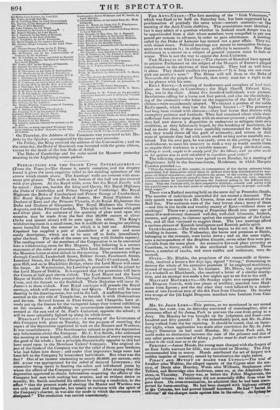THE ANTI-UNION.—The first meeting of the " Irish Volunteers," which
was fixed to be held on Saturday last, has been suppressed by a proclamation of precisely- the same tenor—mutatis mutandis—as the meeting of the Anti-Union clubbists. The associations were identical ; but it may admit of a question whether in Ireland much danger was to be apprehended from a club whose members were compelled to pay one pound per annum in advance, in order to gain admittance. A meeting called by the Duke of Leinster has turned out a poor affair. They sat with closed doors. Political meetings are meant to strengthen Govern- ment or to weaken it ; in either case, publicity is necessary. Men that deliberate in a corner on a subject of general concern must be fools or worse. This is not the way to oppose the Anti-Unionists.
THE MARQUIS or EXETER.—The electors of Stamford have agreed to petition Parliament on the subject of the Marquis of Exeter's alleged interference in the elections of that borough. They had as well leave it alone. They should recollect the proverb—" It is long ere one crow pick out another's eyes." The House will tell them as the Duke of Newcastle did the people of Newark, that every man has a right to do as lie pleases with his own.
KENT Rtors.—A meeting of landowners and occupiers of land took place on Saturday, in Canterbury ; the High Sheriff, Edward Rice, Esq., was in the chair. About five hundred: individuals were present. Resolutions calling for a horse and foot patrol, and also for the embody.. big of the yeomanry—the latter on the suggestion of the Earl of Win- chilsea—were unanimously adopted. We extract a portion of the noble Earl's speech, which does him the highest honour :—" The peasantry had long been visited with distress ;--they had borne that distress with exemplary patience and fortitude. They had remained silent while their sufferings bore down upon them with an onerous pressure ; and although they had now shown a disposition to endeavour to mitigate their own condition, as they fallaciously hoped, by the breaking of machinery, he had no doubt that, if they were equitably remunerated for their daily toil, they would throw off the garb of animosity, and return to that state of quietude they had with much credit so long and so manfully sus- tained. For his own part, he was ready, even to the putting down of his establishment, to meet his tenantry in such a way as would enable diem to requite their workmen in a suitable manner. Every able-bodied man, willing to work, ought to be amply paid for his labour, and no other mode in his opinion was so well calculated to conciliate good order."
The following resolutions were agreed to on Monday, by a meeting of Magistrates held in the Sessions-house, Maidstone, at which Marquis Camden presided :—
" That the Justices of this county, in consequence of the daring outrages lately committed, feel themselves called upon to declare their firm determination to sup- press all illegal assemblies, and to preserve the peace of the county, by calling into active execution the powers vested in them by law. That, with this view, constant communications be established between the Justices acting in the different divi- sions. That the Justices will, in their respective districts, consult and advise with the parishioners as to the best mode of employing the lab2urers at proper and suffi- cient wages."
There was a Radical meeting held on the same day at Penenden Heath. The number of individuals assembled did not exceed a thousand. The only speech was made by a Mr. Crawte, from one of the windows of the Bull Inn. The audience were of the very lowest class ; many of them —and this in the fertile and wealthy county of Kent—without shoes or stockings! There was a meeting at Penenden Heath two years ago of about five-and-twenty thousand well-fed, well-clad labourers, farmers, yeomen, and gentry, to clamour against the emancipation of the Catho- lics, and all that ventured to support them. The two meetings afford a curious picture of Kentish intelligence and Kentish public spirit. INcENDiARIEs.—The fires which had begun to die out in Kent are kindling in Sussex. On Wednesday, the barns and premises at Battle, belonging to the overseer, were burnt down ; and on the same night, says a correspondent of the Brighton Gazette, seven other fires were per- ceivable from the same place. An extensive fire took place yesterday at Caterham, in Sorry, which is also attributed to incendiaries. Three barns, a number of stacks, and some stables and outhouses, were de- stroyed, SwiNG.—Mr. Ritchie, the proprietor of the steam-mills at Green- wich, received a letter a few days ago, signed " Swing," threatening to destroy the whole of his extensive premises if he employed machinery, instead of manual labour, in his business. Mr, Dixon, the proprietor of a windmill on Blackheath, also received a letter of a similar descrip- tion, and an attempt was made a few nights ago to set fire to the mill. MILITARY MOVEMENTS.—On Sunday night two companies of the 5th Dragoon Guards, with two pieces of artillery, marched into Maid- stone from Epsom ; and the day after they were followed by a detach- ment of two hundred men of the 8th Foot from Chatham. On Sunday two troops of the 7th Light Dragoons marched into Lenham from Can- terbury.


























 Previous page
Previous page